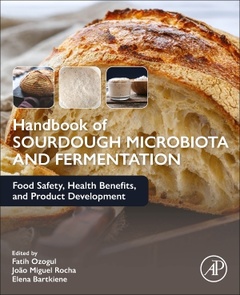Handbook of Sourdough Microbiota and Fermentation Food Safety, Health Benefits, and Product Development
Coordonnateurs : Ozogul Fatih, Rocha João Miguel, Bartkiene Elena

Handbook of Sourdough Microbiota and Fermentation: Food Safety, Health Benefits, and Product Development links the cereal and sourdough-based microorganisms, fermentations and microbial metabolites with food hygiene and safety, functional and health promoting properties, and their potential interest to be employed in the agro-food sector and beyond. Structured in a way that provides the latest findings and most recent approaches and trends on sourdough this book also emphasizes the biotechnological aspects, such as fermentation, food processing and the use of beneficial microorganisms and their metabolites in different ways and in different industries. Written by experts from a multidisciplinary perspective, this book is a remarkable reference to a wide range of audiences with different backgrounds, from academics and researchers in food science to industrial food engineers and technicians, food plant managers, and new product and processing developers/managers in food packaging and preservation.
1. Chemical and physical food safety contaminants and preventive control on sourdough and bakery products
2. Safety aspect of natural starter used in sourdough products
3. LACTIC ACID BACTERIA FROM SOURDOUGH WITH ANTIMICROBIAL PROPERTIES
4. The impact of the lactic acid bacteria on the food-borne pathogens in sourdough-based products
5. Ropiness, bacterial and mould food spoilage in sourdough and bakery products
Section 2: FUNCTIONAL AND HEALTH PROMOTING PROPERTIES OF SOURDOUGH-BASED MICROBIOTA AND FERMENTATIONS
6. Recent development in the microbial diversity in sourdoughs
7. Recent advances in food poisoning and respective diseases in baking products
8. Functional and health promoting properties of lactic acid bacteria (LAB) from sourdough-based and other agro-food products
9. The impact of fermentation on development of medical foods (for Celiac, IBS patients)
10. Functional and health promoting properties of acid-tolerant yeasts from sourdough-based and other agro-food products
11. Nutritional value and health benefits in the gut microbiome of sourdough-based and other baking products
12. The food-gut-health axis of dairy lactic acids bacteria
13. Sourdough-based microbiota, fermentations and development of taste and aroma active compounds and their impact on the final products and in the global sensorial perception and preferences by the consumers
14. Sourdough-based microbiota, fermentations and the development of antimicrobial and antioxidant metabolites
15. Sourdough-based microbiota and fermentations as a source of exopolysaccharides (EPS), starch, dietary fibres, phenolic acids, fatty acids, phytosterols and other bioactive compounds
16. The Development of Functional Bread and Other Bakery Products
17. Use of non-conventional ingredients to develop and improve functional and bio-fortified sourdough-based and other bakery products
18. Potential contaminants in sourdough and sourdough-based products and possible solutions
Section 3: APPLICATIONS OF SOURDOUGH MICROORGANISMS AND THEIR METABOLITES IN AGRO-FOOD AND BEYOND
19. Quality, nutritional value, sensory attributes, and shelf-life of gluten-free bread and other gluten-free baking goods
20. Recent advances in sourdough-based microorganisms and their metabolites in dairy, meat, and non-fermented and fermented beverages
21. Recent development in sourdough-based microorganisms and metabolites in nutraceuticals and dietary supplements
22. Sourdough-based microorganisms and metabolites in cosmetic and pharmaceutical products
23. Recent development in sourdough-based metabolites in biochemical products
24. The role of sourdough technology in modulating the sensory and rheology properties of the alternative food sources (macro/microalgae, insects, fungi)
25. Emerging trends in baking market and consumers’ demands, preferences, and acceptance of sourdough-based products
João M. Rocha PhD, is a researcher at Laboratory for Process Engineering, Environment, Biotechnology and Energy (LEPABE), Department of Chemical Engineering (DEQ), Faculty of Engineering, University of Porto (FEUP). His PhD is in Food Science and Engineering from University of Lisboa. He is the Chair, Principal Coordinator and Grant Holder Scientific Representative of the COST Action SOURDOMICS (CA18101) with 55 countries from 5 Continents. He is also Secretary of the General Assembly board of the National Association of Science and Technology Researchers (ANICT). His research activities and interests related with cereal science and sourdough biotechnology encompasses: phenotypic and genotypic screening and characterization of microorganisms; design and development of fermentation processes and starter cultures; production, extraction and purification of functional microbial metabolites; design of innovative food products and processes and valorization of by-products and food wastes; food safety and ascertaining the health promoting effects,
- Covers how cereal-based and sourdough microorganisms and microbial metabolites can be used to extend the shelf-life of bread and other agro-food products
- Presents microbial safety, fermentations, ropiness of baking-based products, bacterial and mold food spoilage, and the health promotion of sourdough and cereal-based products
- Describes how cereal and sourdough-based products can contribute to convenient, nutritious, stable, natural, low-processed and healthy food
Date de parution : 10-2024
Ouvrage de 584 p.
19x23.3 cm



